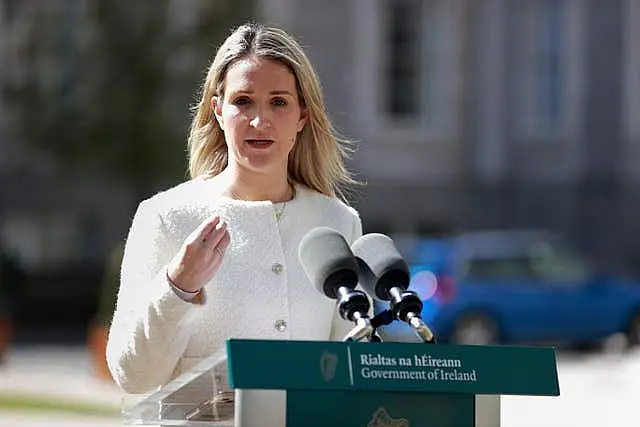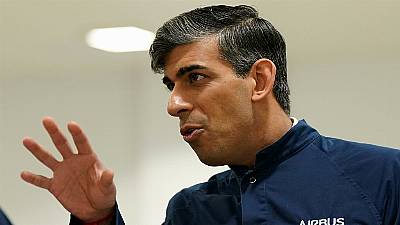Taoiseach Simon Harris has said Ireland will not “provide a loophole for anybody else’s migration challenges”.
He was speaking after UK prime minister Rishi Sunak said claims that the UK government’s Rwanda plan is causing an increase in migration to the Republic shows its deterrent effect is working.
The Government has said there has been a shift in migration patterns into the Republic in recent months and that the number of migrants crossing the Border from the North was now “higher than 80 per cent”.
Legislation is to be introduced next week in response to a High Court ruling that the State’s designation of the UK as a “safe third country” for returning asylum seekers, in the context of the Rwanda plan, is contrary to EU law.
The UK’s Rwanda plan aims to send asylum seekers to the east African nation to deter others from crossing the Channel on small boats.
Asked on Sunday whether the increase in asylum seekers travelling from the UK to the Republic suggested the Rwanda policy was working, Mr Harris said: “I’m not going to comment on whether the British migration policy is working, that’s a matter for him (Rishi Sunak) to put to the British people.”
He said: “Every country is entitled to have its own migration policy, but I certainly don’t intend to allow anybody else’s migration policy to affect the integrity of our own one.
“This country will not in any way, shape or form provide a loophole for anybody else’s migration challenges. That’s very clear.
“Other countries can decide how they wish to advance migration. From an Irish perspective, we intend to have a firm rules-based system where rules are in place, where rules are in force, where rules are seen to be enforced.

“It is a statement of fact that there was a returns agreement in place between Ireland and Britain, and there was a High Court decision in the month of March in relation to that.
“My colleague, the Minister for Justice, will now bring forward legislative proposals to Cabinet on Tuesday that will seek to put in place a new returns policy. We’re going to await the full details of that, but it’s one which will effectively allow, again, people to be returned to the United Kingdom. And I think that’s quite appropriate. It was always the intention.”
Asked whether checks would be carried out along the border as a result of the migration increase, Mr Harris said: “It is, again, a statement of fact that the PSNI and the Gardaí already collaborate and work together, I do certainly think there’s going to need to be much more of that in terms of collaboration.”
He said Minister for Justice Helen McEntee would meet with UK home secretary James Cleverly on Monday.
Meanwhile, Northern Ireland’s First Minister Michelle O’Neill has called for a “thought-out” response between the Irish and UK governments.
Sinn Féin vice president Ms O’Neill said neither Mr Harris, Ms McEntee nor Tánaiste Micheál Martin had yet been in contact with her about planned legislation on asylum seekers arriving in the Republic from the UK.
“I am the First Minister in the North, and I have yet to hear from the Taoiseach or the Tánaiste or the Justice Minister,” she said in Dublin on Sunday morning.
“To me, that highlights, maybe even underlines, how disorganised they are in dealing with this issue.
“Policy responsibility for migration and immigration sits with the British government, I’m aware that Helen McEntee is to meet James Cleverly over the course of the next 24 to 36 hours.
“There’s also a British-Irish intergovernmental conference this week. This is the forum in which these issues need to be addressed.
“This is the forum in which there should be a solution coming out the other end, but a thought-out solution, an actually considered solution, a human rights compliant solution, and we look forward to (that) over the next couple of days.”
Ms O’Neill was speaking at a launch of the party’s local, European and Limerick mayoral election campaign in Dublin.

Sinn Féin leader Mary Lou McDonald, who was also at the event, argued that cross-border migration means Ireland should reject a newly-revealed overhaul of EU laws on migration and asylum.
“We now hear that the Government has plans to address the issue of those who have claimed asylum in Britain and who then move on to the island of Ireland,” Ms McDonald said on Sunday.
“We want to see what those plans are. Clearly, there has to be an efficient way of managing all of this.
“By the way, life has to continue on the island – people have to come and go to work, business and commerce has to flow. I dearly wish that we didn’t have a border on the island. Sadly, for now anyway, we do.
“So, ordinary life has to go on as normal. And then we need a plan that is resourced and delivered to deal with this issue.

“I hear that they are saying that they will now have accelerated procedures for people who are making a claim. I think that would be very welcome, but I’m conscious also we’ve heard commitments like this before and they haven’t been delivered on.”
Asked about plans to overhaul the EU’s migration system, Ms McDonald said: “I think the turn of events and the specific set of circumstances that we have to deal with on the island of Ireland actually argue against signing up to the EU migration pact lock, stop and barrel.
“Unlike other European jurisdictions, we have to deal with our next-door neighbour of Britain and we have to have the flexibility and the capacity to manage that.”







